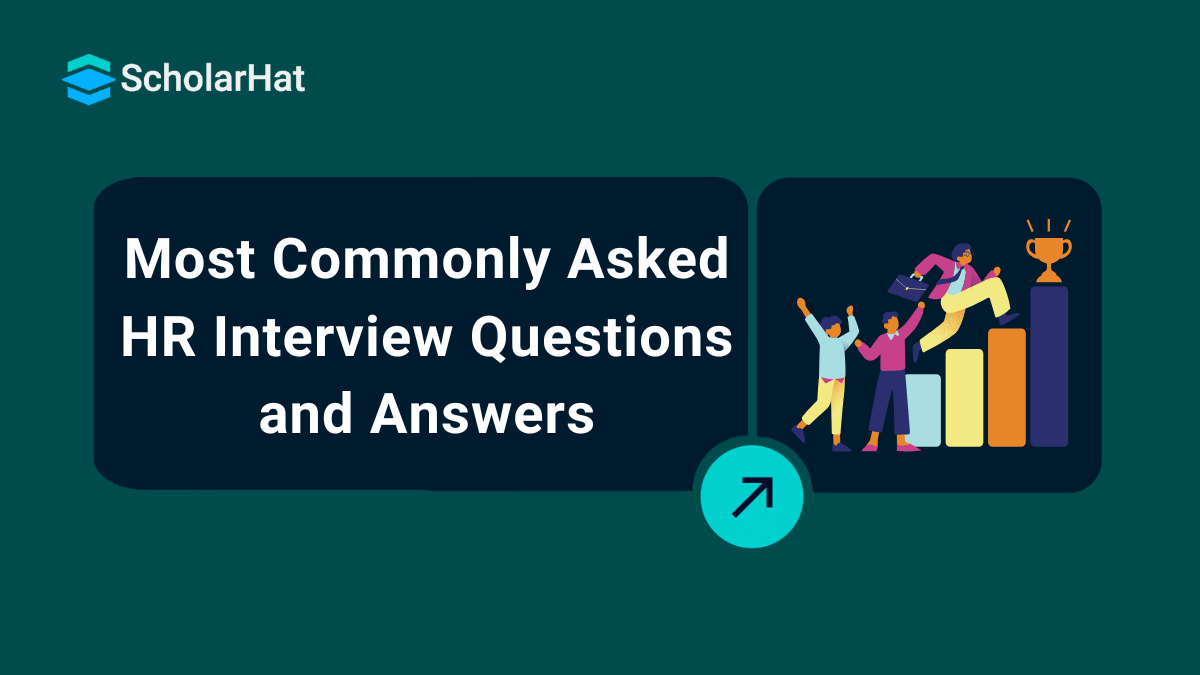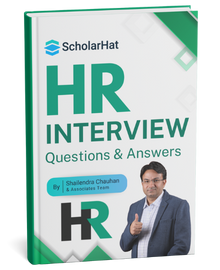20
FebMost Commonly Asked HR Interview Questions and Answers
No matter if this is your first or your fiftieth interview, having everything well planned and prepared will have a positive impact on your confidence and, ultimately, on your success. This article contains the most commonly asked interview questions and answers in an HR Interview.
HR Interview Questions and Answers
Q1. Tell me something about yourself in brief
This question will usually come at the start of your interview; thekeyword is 'Brief'. Don't go into every detail, more questions related to this will come up later. The main aim of this is to give you the opportunity to start speaking, a few points like name, age, where you come from, present job/ or what you have been studying. Possible add-ons could be some descriptive character traits, for example, I'm conscientious, trustworthy, and keen to make my mark in [chosen field].
Q2.What are your strengths and weaknesses?
This is an old favorite with interviewers and can cause problems. The point of asking this is to gauge your honesty and to judge how well you know yourself. Don't try to avoid your weaknesses, we all have them, one way to deal with them is to refer to weaknesses as past experiences, for example, I used to be...., in the past I was...., followed by however having introspected and learned from my mistakes I have overcome the drawbacks this created. Talk about your strengths positively but without showing off, keep them fairly simple and broad, for example, I'm a quick learner, a good listener, empathic, assertive.
Q3.Did you ever have a conflict with your current/previous boss or professor?
Conflict is a strong word so try to divert from it, for example, I wouldn't say there was ever any conflict, rather I have always been sympathetic to others views/ I prefer to discuss matters that might create conflict/By being unbiased, yet assertive I generally find any conflict can be circumvented.
Q4.Explain the difference between group and team.
The obvious difference is that a group need not necessarily be all working with a common goal, whereas a team will be utilizing the individual specialist skills of everyone to achieve a unified aim.
Q5.Are you a team player?
The first point, answer the question and DON'T say NO. Even though over the last few years the importance of team players has lost some of its importance its always best to say you are a team player. Your ability to share your skills and interact productively with others is an essential and valued skill looked for by employers. However, show that you are equally adept at working on your own initiative, For example, "Although I know the value of teamwork on occasions where my skills are required and I have to deal with projects etc. single handed I’m confident enough to handle things on my own".
Q6.Where do you see yourself 3 years from now? or Where do you see yourself in 5 years?
OK, another old favourite with interviewers, first and foremost DON'T say what one of my ex-students said; "I want your job". It’s best not to deal with specifics, in terms of position, salary, promotions etc.
Something along these lines is about the best way to deal with it:
"Having proved myself to be a valued and integral part of the team I feel sure I will receive suitable increments related to my skills. Overall, I would aim to achieve a position with XYZ company with greater responsibilities and challenges, ideally gaining greater respect and acknowledgement from where I can utilize everything, I have learned to enable to company to achieve its corporate identity at a higher level".
Q7. What are your future goals?
Basically, this is no different to 'Where do you see yourself in 3/ 5 years’ time.
Q8.What is your ideal company or workplace?
Your response here should focus on qualities like Cooperation, environment, appreciation, and interaction, not on financial, promotion, or fringe benefits like paid holiday leave etc.
Q9. What makes you angry?
You need to emphasize that you have good anger management skills, it’s important to indicate that you don't get angry without fully understanding a situation. Anger usually stems from frustration which arises because things are not going how you want them to go, so whenever dealing with things you make contingency plans, look for possible problems and circumvent them in advance, that you are a good listener and that everybody has their own agenda which needs to attend to. Think of the three Cs 'Cool, Calm, and Collected'.
Q10.Are you open to taking risks?
Risks indicate danger, and therefore if you say Yes you could create an image of someone who would put things in jeopardy, however, if you say No the interviewer may think you are not willing to make changes. So, you need to show that you, in consultation with co-workers and line managers, would undertake a risk analysis so that damage limitations can be implemented before committing to any uncertain development.
Q11.Do you like experimenting?
Pretty similar to the above question, experimenting is good but needs to be done on a trial basis.
Q12.Tell me about your short-term and long-term goals?
Think about your response chronologically, establishing yourself in the company, growing and developing, gaining respect, contributing, having a positive impact, leading to appreciation in the form of promotion to a post where your skills take the company to the highest level in that field.
Q13.What motivates you?
Don’t say Money, phrases to consider using are appreciation within the company hierarchy, knowing you have done your best work, that you have made a positive contribution to the company, successfully achieving desired outcomes.
Q14. Do you have any role models? If so, who are they, and why are the role model?
Again, think of inspiration, people who have achieved a lot against all the odds. And finally, remember you have as much chance as anyone else applying for the job of being successful, keep cool, calm and collected, the company is looking for an employee as much as you are looking to be employed. OK it’s a competitive world but on the day, you are only competing with yourself, so learn from this book how best to put yourself forward as the ideal candidate, focus on how closely you match the job description, what makes you unique, how involved and passionate you are about a career with the company and how you will be a benefit to the organization. Make sure you deal with everything logically, keep your thoughts together, don’t get flustered, this is being collected. Keep cool, again don’t get flustered or become intimidated, if you feel frustrated remember not to get angry, keep calm, avoid arrogance, be honest and have faith in yourself.
Success is within your grasp, and by following this guide, you will find success in the employment market.
Q15.Why did you (or why do you want to) leave your current employer?
Make sure you speak positively about your present/ previous employer. Intimate that you feel/ felt that you had little room for further development, and now you are looking for greater responsibility and challenges.
Q16.Tell me about the worst boss you ever had.
You have never had a bad boss. Ok, mention that sometimes you disagreed, but you always showed respect and put your point of view across tactfully.
Q17. How do you feel about working weekends and night shifts?
Fundamentally you have to say that you are happy to do it, otherwise, you stand less chance of being selected. However, make sure you don't come across as a subservient slave, add on to your acceptance things like; "I would, of course, require some prior notice", or "As long as these were fixed in advance and suitable recompense was forthcoming, I can see no difficulty". DON'T ask for more money.
Q18.Give an example of a time you had to respond to an unhappy manager/ customer/ colleague/ professor/ friend.
The key here is to state that you took any criticism positively, that you learned from your mistakes, and that you remained calm.
Q19. What are your most significant achievements to date?
Think about an accumulation of things rather than just one thing, emphasize how all the things you have done have brought you to this point in life where you are ready to move forward.
Q20.If you won a 10-crore USD/INR lottery, would you still work?
This is related to a question which asks, 'What is more important to you, a high salary or job satisfaction'. Ok we all need money but you shouldn't give the impression that money is the be all and end of all in your life, however, you also don't want them to think you are a workaholic. Better to say that you would continue working because of the satisfaction it provides, and you would invest the money in helping others gain the skills they need or invest it in a sustainable future for your family.
| Download this PDF Now - HR Interview Questions PDF By ScholarHat |
Summary
I hope these questions and answers will help you to crack your HR Interview. These interview Questions have been taken from our new released eBook HR Interview Questions & Answers. This book contains more than 60 HR interview questions.
If you are preparing for the HR interview, this HR interview Questions and Answers Book can really help you. It has simple questions and answers that are easy to understand. Download and read it for free today!










